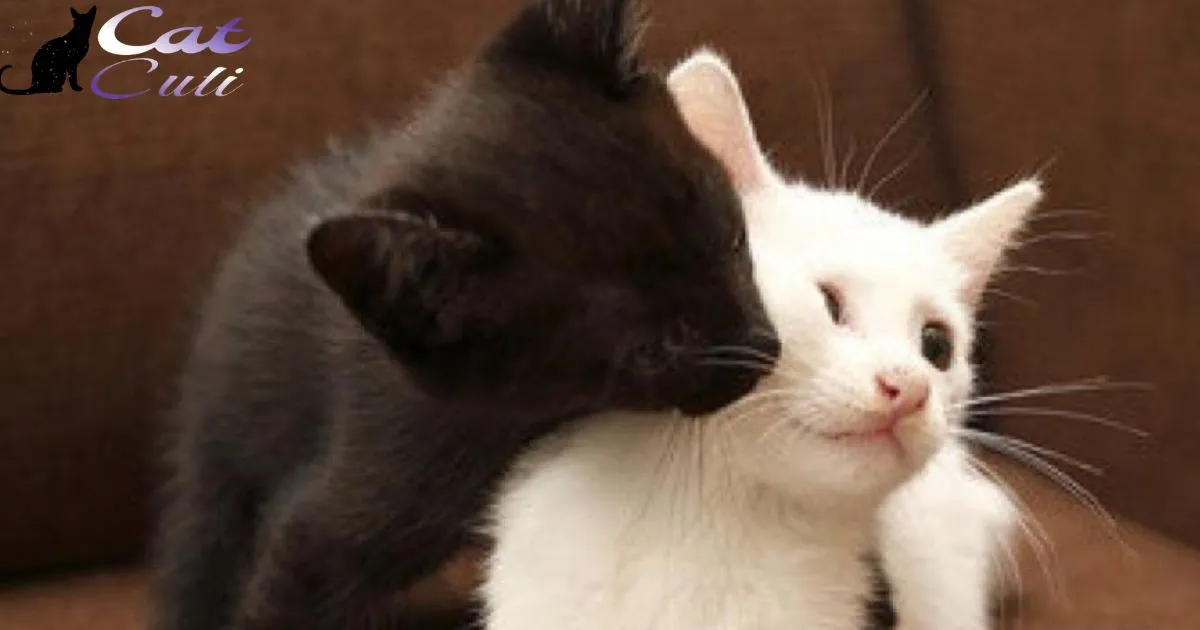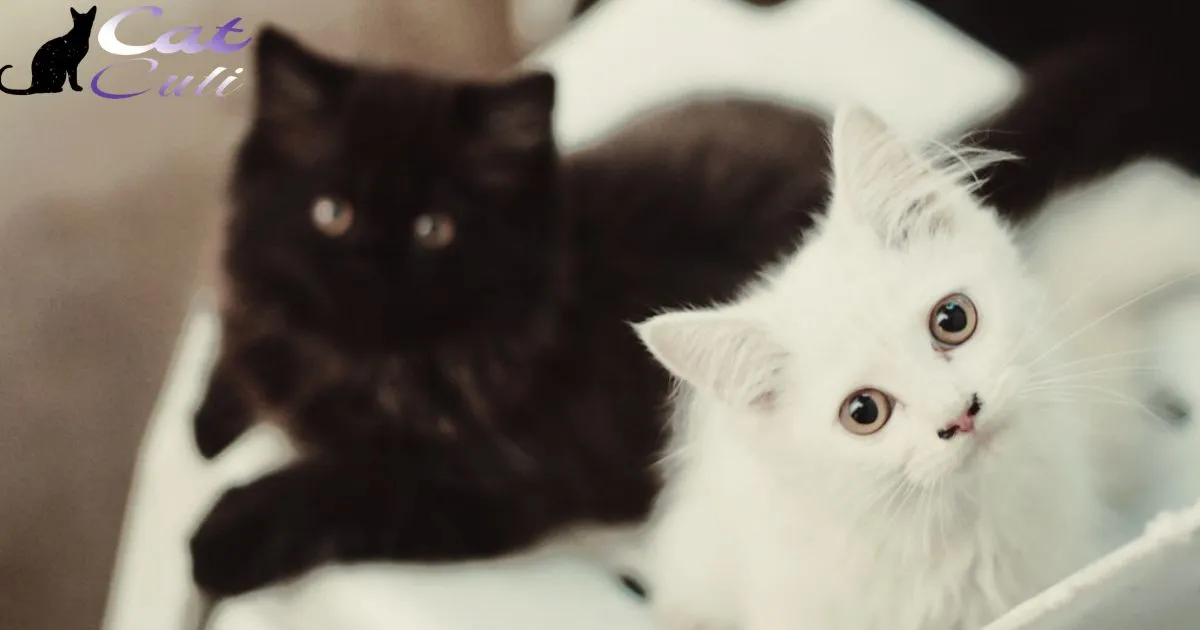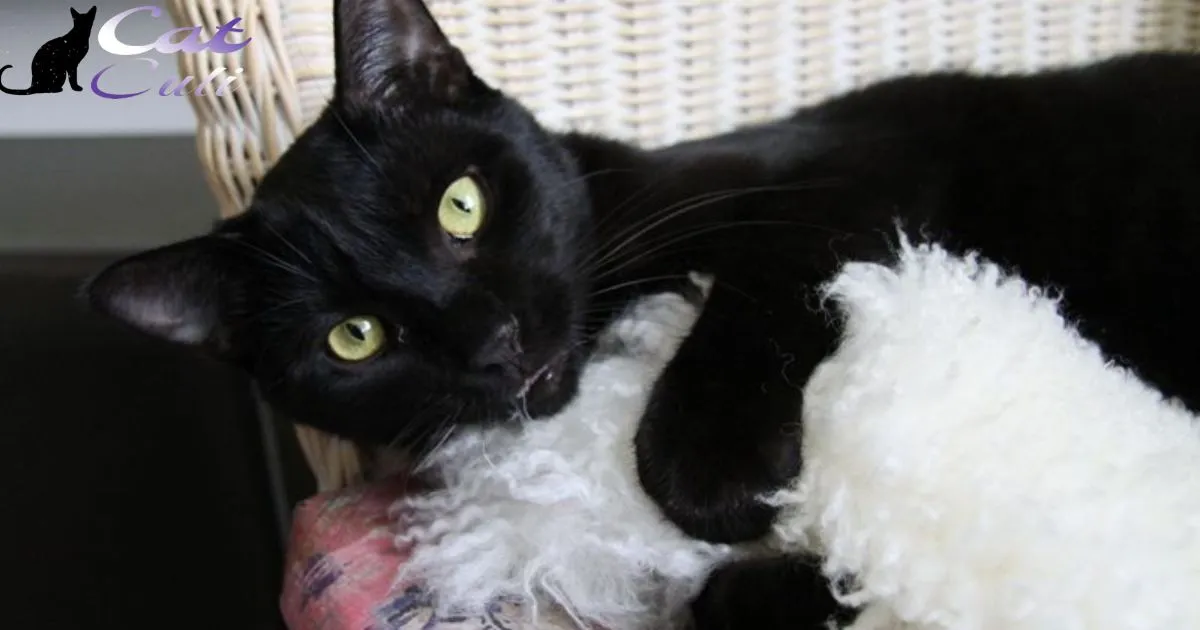Black kittens may start growing white hairs as they age. This can happen due to genetics or health issues. Some black cats are related to gray or smoky colored cats. Their fur color can change multiple times while young.
White hairs may also come from skin conditions like vitiligo. This causes fur color loss. Thyroid problems can lead to fur color changes too. Injury or stress may cause black hair to grow back white after falling out. Check with your vet if the white hairs seem abnormal. But some white hairs are normal as black kittens mature, especially on the face and paws.
The main reasons black kittens get white hairs are genetics, vitiligo, thyroid issues, injury, and aging. Check with your vet if you have concerns, as it can signal illness. But some white hairs are common, so monitor your kitten to see if white patches spread. Focus on keeping them healthy and content!
Why Is My Black Kitten Getting White Hairs?
Providing cat owners with insightful information on potential causes and solutions for white hairs appearing in black kittens’ coats
As the proud parent of an adorable black kitten, you likely chose them for their beautiful, silky dark coat. So you may be surprised when white hairs begin mingling with the black. Is this normal? Should you be concerned? This article dives into the common reasons behind white hairs popping up on black kittens, when it could signal underlying issues, and what you can do to keep your pet’s coat healthy.
Typical Explanations for White Hairs on Black Kittens
Before worrying, it helps to understand the benign reasons white hairs often appear in black kittens’ coats:
Maturing Coat Colors
- As black kittens mature, white hairs emerging is fairly common, especially on the face, paws, chest, and belly
- Their adult coat comes in fuller as they age, revealing additional colors
- White hairs signify a cat carries diluted color genes like gray or smoke
Normal Shedding/Regrowth Cycles
- Kittens shed infant coats around 6 months old
- New adult hairs re-growing can reveal alternate colors
- Damaged hairs can also grow back white or lighter
Breed Characteristics
- Some cat breeds with black coats are predisposed to white spotting
- Examples include tuxedo cats, black smoke cats, black bi-colors
- White hairs are expected in these breed coats
Vitiligo
- Rare skin condition causing pigment loss and white patchy fur
- May affect some black kittens, often on the nose and lips
- Usually harmless, but vet visit recommended to confirm
Black Cat With White Hairs Breed
| Breed | Description | White Hair Details |
| Bombay | Sleek, black coat cat breed | Kittens may have white hairs on belly, tail |
| American Shorthair | Round face, expressive eyes | Can be black or other colors/patterns |
| British Shorthair | Stocky, plush black fur | Usually solid black coat |
| American Bobtail | Bobbed tail, varied colors | White hairs not typical for this breed |
| Tuxedo Cat | Black and white patchy fur | By definition will have white areas |
| Black Smoke Cat | Black fur with white roots | Commonly have some white hairs |
Conversely, breeds like British Shorthairs typically exhibit solid black coats. It’s interesting to note that the American Shorthair breed encompasses cats of both black and different colors. My Cat Suck On My Shirt. Therefore, the presence of white hairs is contingent upon the unique genetics of each individual cat.
When to Worry About White Hairs in Black Kittens

While white hairs are commonly normal in black kittens, sometimes they indicate an underlying issue requiring veterinary attention.
Rapid Spreading of White Fur
- Normal for a few random white hairs, but monitor for spreading patches
- Quickly enlarging white spots could mean vitiligo or other skin disorder
Associated Health Changes
- Along with fur color shifts, watch for appetite, activity, or mood changes
- Could signal thyroid disorders, hormonal imbalances or other issues
Potential Link to Trauma/Stress
- Skin irritation, injuries or stressful events may damage fur and follicles
- New hair after shedding distressed areas can grow back white
- Monitor to ensure white patches don’t expand rapidly
If you notice any above changes, schedule a veterinarian visit. Diagnostic tests can help determine if an illness is causing the coat alterations.
Why Is My Black Kitten Turning Grey
Black kittens may start growing gray fur as they mature. Their coat goes through changes while young. Many black cats carry diluted color genes from ancestry. These genes can reveal themselves as smoky gray or silver fur over time.
Greying may also come from normal shedding cycles. The new adult hairs re-growing in can be lighter colors. Sometimes skin issues like vitiligo will cause fur color loss too. This creates grey patches. Check with your vet if the color change seems abnormal. But some greying is expected in young black cats due to genetics and natural coat changes.
The main reasons black kittens turn grey are maturing coat colors, genetic ancestry for diluted fur, skin disorders like vitiligo, and normal hair growth cycles. Monitor for any rapid spreading of grey hair. But some greying is common in young cats. Focus on nutrition and reducing stress to support a healthy coat.
What to Do About White Hairs in Black Kittens
If your black kitten is sprouting white hairs, take these actions to keep their coat healthy:
Provide a Nutritious Diet
- Ensure diet includes animal-based proteins and omega fatty acids
- Supplement with vet-recommended skin and coat formulas
- Keep clean, fresh water available at all times
Groom Regularly
- Use a stainless steel comb to distribute skin oils naturally
- Check for skin irritation during grooming sessions
- Bathing is not necessary unless truly dirty
Address Any Skin Issues
- Treat parasites, ringworm, injuries, allergies, etc. promptly
- Ask vet about medicated shampoos if needed
- Prevent excessive scratching/irritation
Reduce Stress
- Cat-proof home using regular play sessions, cat trees, toys
- Maintain consistent routines for feeding, litter box, sleep
- Consider synthetic feline pheromones to ease anxiety
Visit the Veterinarian
- Have annual wellness exams to catch problems early
- Discuss any coat or skin changes with your vet
- Diagnose and treat any underlying medical conditions
With attentive care and prompt treatment of any health issues, your beloved black kitten can stay happy and healthy as they mature into an adult cat.
When to Schedule a Vet Visit for White Hairs in Black Kittens
While some white hairs are harmless in black kittens, unusual changes to your cat’s coat deserve an expert veterinarian’s opinion. Make an appointment if you notice:
- Sudden increase in white hairs spreading rapidly
- Expanding white patches looking spotty or scaly
- Changes only affecting one area of the body
- Hair loss accompanying the white hairs
- Symptoms like itching, flaking or redness along with fur changes
- Signs of illness such as appetite changes or lethargy
Tracking details about when white hairs appeared, their location and any associated symptoms will help the vet determine next steps. Diagnostic tests may be recommended. With prompt care, even health-related coat issues often have good outcomes.
Why Do Black Cats Have White Hairs On Chest

Black cats often grow white hairs on their chest as they age. This happens due to genetics. Many black cats carry color dilution genes. These reveal themselves later as stray white hairs. The fur on a cat’s chest is also more sensitive to hormonal changes.
As cats age, fluctuating hormones can cause white hairs to appear on the throat and chest. Stress may also trigger white fur growth in sensitive areas. Skin irritation can cause black fur to grow back white when it sheds and regrows.
Check with your vet if the white hairs spread quickly or cause itching. But some white chest hairs are harmless on aging black cats.Black cats commonly get white hairs on their chests as they mature.
This occurs from genetic ancestry for diluted fur colors, hormonal changes, stress, and normal shedding cycles. Unless the white patches grow rapidly or show irritation, they are normal. Focus on keeping your cat content and healthy.
Achieving Skin and Coat Health in Black Kittens
While a sprinkling of white hairs may be outside your control, you can take proactive steps to support your black kitten’s skin and fur health:
Choose a High-Quality Diet
- Select a brand meeting AAFCO standards for nutritional adequacy
- Seek recipes with animal-based proteins as first ingredient
- Supplement with oils high in omega-3 and omega-6 fatty acids
Establish a Grooming Routine
- Use a stainless steel comb to distribute natural oils from skin
- Check for any irritation, parasites or skin issues while brushing
- Only bathe if truly dirty or medicated shampoo prescribed
Address Any Underlying Health Issues
- Have your vet diagnose and treat skin disorders, infections, etc.
- Discuss any potential hormone imbalances or endocrine diseases
- Follow prescribed treatment plans for conditions affecting coat
Limit Stressors
- Increase play, exercise and mental stimulation
- Keep feeding and litter box cleaning schedules consistent
- Consider synthetic pheromone plug-ins to ease anxiety
As long as your black kitten is healthy and content, embrace their sparkle of white hairs as a unique part of their appearance. With attentive care and prompt treatment of any medical conditions, you can help your kitten’s coat stay lush and beautiful as they mature.
Common Questions on Black Kittens Growing White Hairs
Here are answers to some frequently asked questions about black kittens developing white hairs:
Are white hairs on my black kitten normal?
Yes, white hairs are typically normal, especially on the face, paws, undercarriage and as kittens mature. But monitor for any expanding white patches which may indicate skin disorders.
Will my black kitten turn white?
It’s unlikely a black kitten’s coat will turn fully white. White hairs emerging is usually limited. But some color dilution is common if they carry smoke or silver lineage.
Should I pluck out the white hairs?
No. Plucking hairs can irritate the skin. Accept the dash of white as a unique trait of your black cat. Monitor for rapid spreading white patches instead.
Can white hairs in black cats be reversed?
Sometimes. Addressing causes like nutritional deficiencies, skin fungal infections, or hormonal imbalances may help restore fur to original color. But white hairs due to genetics, aging or skin disorders are permanent.
Could my cat’s food cause white hairs?
Potentially. Diets deficient in animal proteins, fatty acids, vitamins and minerals may contribute to coat issues. Ask your vet about supplements or prescription foods to support skin and fur health.
Conclusion
It’s common for black kittens to start sprouting white hairs as they mature. This happens due to natural coat changes, genetics, or skin disorders like vitiligo. Monitor for rapid spreading of white fur which may mean illness. But small amounts of white are harmless.
Keep your kitten healthy with good nutrition and gentle grooming. Reduce stressors in their environment. Schedule annual vet checks to catch problems early. With attentive care, you can support your black kitten’s skin and coat health. Embrace the speckled fur as their unique look.








